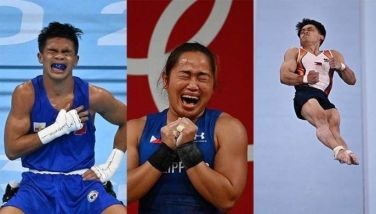Vietnam surge not surprising

December 11, 2003 | 12:00am
Hosting the Southeast Asian (SEA) Games is no assurance of a dominating performance even as the hometown advantage is sometimes the X-factor in deciding the outcome of a contest in a sport like boxing, taekwondo or wushu where subjective judgment often holds the key to victory or defeat.
In Vietnam’s case this year, it’s not surprising the once war-torn nation of 81 million people is lording it over the medal standings. Displaying the courage that was evident in Dien Bien Phu in 1954 and the Tet Offensive in 1968, the Vietnamese athletes are on the way to clinching top overall honors in the 22nd staging of the 11-nation conclave. Second place Thailand isn’t close to threatening.
The records show that host nations topped the medal standings in five of the last nine stagings of the SEA Games. Malaysia took overall honors for the first time when it hosted the 21st Games two years ago. The Philippines fell a gold short of tying Indonesia for first place in Manila in 1991.
There are 442 gold medals in all up for grabs in 32 events in Vietnam and after six days of competition, the host nation has collected 73 with 241 still unclaimed. If Vietnam keeps the same pace until the end of the 10-day joust, it will finish with 160 golds.
Vietnam struck out bowling, golf, squash and equestrian, among others, in the calendar of events–a discretion that is a host’s right. It included fin swimming and shuttlecock but neither is medal-rich. Vietnam has vaulted to the top through sheer hard work, focus, guts and a little bit of friendly persuasion.
On the first day of competitions, Vietnam garnered 24 golds to stamp its class. In the early reckoning, Vietnam swept to 21 golds in shooting, 12 karate, six apiece in wrestling and judo and four each in gymnastics and athletics. More golds are expected from taekwondo and wushu.
At the Busan Asian Games last year, Vietnam collected four golds, seven silvers and seven bronzes to finish ahead of the Philippines with three golds, seven silvers and 16 bronzes. Vietnam’s medals came from billiards and snooker (2), bodybuilding (2), karate (3), taekwondo (5), sepak takraw (2), shooting (l) and wushu (2).
Two of Vietnam’s four Asiad gold medallists struck paydirt in the ongoing SEA Games–bodybuilder Ly Duc and libre carom specialist Tran Dinh Hoa. The two others–karate’s Vu Kim Anh and Nguyen Trang Bao Ngoc–were good for only bronze in kumite in the SEA Games, indicating the depth of Vietnam’s sports pool.
In Sydney three years ago, Vietnam bagged its first-ever Olympic medal, a silver from Tran Hieu Ngan in the 126-pound division of women’s taekwondo. Enroute to the podium, Tran eliminated the Philippines’ Jasmine Strachan, 8-3. Vietnam sent only seven athletes to Sydney, compared to 20 Filipinos who failed to capture a single medal.
Vietnam’s strong showing in the last Kuala Lumpur SEA Games was a portent of things to come. It delivered 33 golds, 35 silvers and 65 bronzes from 413 athletes who battled in 24 of 32 disciplines. In contrast, the Philippines sent 360 athletes who brought home 31 golds, 65 silvers and 67 bronzes. Vietnam improved from sixth in Brunei two years earlier to fourth.
In this year’s SEA Games, Vietnam is participating in all 32 events while the Philippines is skipping handball, petangque, shuttlecock, men’s football, women’s traditional boat race and fin swimming. Leaving out bowling and golf from the schedule meant less golds for the Filipinos who picked up five in both sports two years ago.
Sports is clearly a priority in Vietnam’s government program which supports 14,000 elite athletes–including 2,000 in the youth category–training in 26 sports. Vietnamese athletes participate in an average of 30 to 40 international competitions a year. The socialist system allows government to prioritize funding for athletes and exact results from National Sports Associations.
The Socialist Republic of Vietnam was established on July 2, 1976–a year after the fall of Saigon ended a 30-year civil war. In 1980, Vietnam was readmitted into the Olympic family and marked its return to international competition at the Moscow Games. It joined the Soviet boycott at the 1984 Los Angeles Olympics but was back in action in Seoul in 1988.
After a 16-year absence, Vietnam reappeared at the SEA Games in Kuala Lumpur in 1989 with 46 athletes garnering three golds, 11 silvers and five bronzes. Slowly but surely, Vietnam began to make strides in the biennial meet until it zoomed to fourth overall in Kuala Lumpur two years ago, capturing golds in wushu (5), taekwondo (4), table tennis (1), shooting (6), pencak silat (6), karate (4), football (1), cycling (3) and athletics (3).
Two years ago, Vietnam declared that it would rise like the phoenix to become one of the top 15 nations in Asian sports, one of the top three in Southeast Asia, and a championship contender in four to five sports on the international level. So far, so good. Vietnam ranked No. 15 in the medal standings in Busan last year–the Philippines was No. 18–and it will surely top the 22nd SEA Games.
Once a nation ravaged by war, Vietnam is on track to make an impact in world sports. The Philippines could learn a lot of lessons in discipline, dedication and determination from the Vietnamese.
In Vietnam’s case this year, it’s not surprising the once war-torn nation of 81 million people is lording it over the medal standings. Displaying the courage that was evident in Dien Bien Phu in 1954 and the Tet Offensive in 1968, the Vietnamese athletes are on the way to clinching top overall honors in the 22nd staging of the 11-nation conclave. Second place Thailand isn’t close to threatening.
The records show that host nations topped the medal standings in five of the last nine stagings of the SEA Games. Malaysia took overall honors for the first time when it hosted the 21st Games two years ago. The Philippines fell a gold short of tying Indonesia for first place in Manila in 1991.
There are 442 gold medals in all up for grabs in 32 events in Vietnam and after six days of competition, the host nation has collected 73 with 241 still unclaimed. If Vietnam keeps the same pace until the end of the 10-day joust, it will finish with 160 golds.
Vietnam struck out bowling, golf, squash and equestrian, among others, in the calendar of events–a discretion that is a host’s right. It included fin swimming and shuttlecock but neither is medal-rich. Vietnam has vaulted to the top through sheer hard work, focus, guts and a little bit of friendly persuasion.
On the first day of competitions, Vietnam garnered 24 golds to stamp its class. In the early reckoning, Vietnam swept to 21 golds in shooting, 12 karate, six apiece in wrestling and judo and four each in gymnastics and athletics. More golds are expected from taekwondo and wushu.
At the Busan Asian Games last year, Vietnam collected four golds, seven silvers and seven bronzes to finish ahead of the Philippines with three golds, seven silvers and 16 bronzes. Vietnam’s medals came from billiards and snooker (2), bodybuilding (2), karate (3), taekwondo (5), sepak takraw (2), shooting (l) and wushu (2).
Two of Vietnam’s four Asiad gold medallists struck paydirt in the ongoing SEA Games–bodybuilder Ly Duc and libre carom specialist Tran Dinh Hoa. The two others–karate’s Vu Kim Anh and Nguyen Trang Bao Ngoc–were good for only bronze in kumite in the SEA Games, indicating the depth of Vietnam’s sports pool.
In Sydney three years ago, Vietnam bagged its first-ever Olympic medal, a silver from Tran Hieu Ngan in the 126-pound division of women’s taekwondo. Enroute to the podium, Tran eliminated the Philippines’ Jasmine Strachan, 8-3. Vietnam sent only seven athletes to Sydney, compared to 20 Filipinos who failed to capture a single medal.
Vietnam’s strong showing in the last Kuala Lumpur SEA Games was a portent of things to come. It delivered 33 golds, 35 silvers and 65 bronzes from 413 athletes who battled in 24 of 32 disciplines. In contrast, the Philippines sent 360 athletes who brought home 31 golds, 65 silvers and 67 bronzes. Vietnam improved from sixth in Brunei two years earlier to fourth.
In this year’s SEA Games, Vietnam is participating in all 32 events while the Philippines is skipping handball, petangque, shuttlecock, men’s football, women’s traditional boat race and fin swimming. Leaving out bowling and golf from the schedule meant less golds for the Filipinos who picked up five in both sports two years ago.
Sports is clearly a priority in Vietnam’s government program which supports 14,000 elite athletes–including 2,000 in the youth category–training in 26 sports. Vietnamese athletes participate in an average of 30 to 40 international competitions a year. The socialist system allows government to prioritize funding for athletes and exact results from National Sports Associations.
The Socialist Republic of Vietnam was established on July 2, 1976–a year after the fall of Saigon ended a 30-year civil war. In 1980, Vietnam was readmitted into the Olympic family and marked its return to international competition at the Moscow Games. It joined the Soviet boycott at the 1984 Los Angeles Olympics but was back in action in Seoul in 1988.
After a 16-year absence, Vietnam reappeared at the SEA Games in Kuala Lumpur in 1989 with 46 athletes garnering three golds, 11 silvers and five bronzes. Slowly but surely, Vietnam began to make strides in the biennial meet until it zoomed to fourth overall in Kuala Lumpur two years ago, capturing golds in wushu (5), taekwondo (4), table tennis (1), shooting (6), pencak silat (6), karate (4), football (1), cycling (3) and athletics (3).
Two years ago, Vietnam declared that it would rise like the phoenix to become one of the top 15 nations in Asian sports, one of the top three in Southeast Asia, and a championship contender in four to five sports on the international level. So far, so good. Vietnam ranked No. 15 in the medal standings in Busan last year–the Philippines was No. 18–and it will surely top the 22nd SEA Games.
Once a nation ravaged by war, Vietnam is on track to make an impact in world sports. The Philippines could learn a lot of lessons in discipline, dedication and determination from the Vietnamese.
BrandSpace Articles
<
>
- Latest
- Trending
Trending
Latest
Trending
Latest
Recommended






























